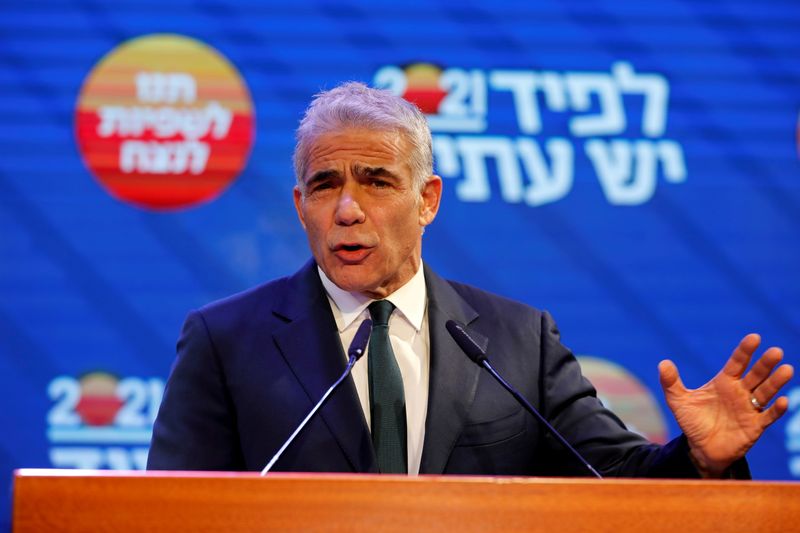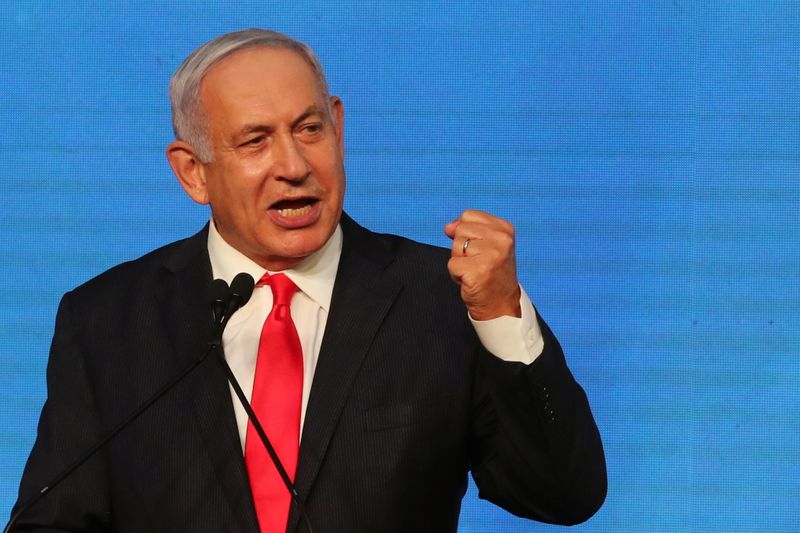By Jeffrey Heller
JERUSALEM (Reuters) -Israel's president on Wednesday chose Yair Lapid, a centrist politician and Prime Minister Benjamin Netanyahu's strongest rival, to try to form a new government, but his path to success was still uncertain.
Israel's longest serving leader, Netanyahu, 71, has been fighting to hold onto office through four inconclusive elections since 2019 and corruption allegations that he denies.
President Reuven Rivlin, in a televised address announcing his choice of Lapid, said the former finance minister had the pledged support of 56 of parliament's 120 members, still short of a majority.
"It is clear that parliament member Yair Lapid could form a government that has the confidence of the Knesset, despite there being many difficulties," Rivlin said.
In a statement accepting the nomination, Lapid, who heads the Yesh Atid party, said he aimed to establish a government of the left, right and centre "that will reflect the fact that we don't hate one another".
But Lapid, 57, has ruled out serving in a government with Netanyahu, citing the criminal indictment against the prime minister.
Appearing to hold out hope he could still stay in power, Netanyahu appealed to ultranationalist Naftali Bennett to join him and form a "solid right-wing bloc" controlling 59 seats in parliament, a number still short of a majority.
An embrace by Bennett, of the Yamina party, would persuade other right-wing legislators currently pledged to Lapid cross back, Netanyahu said in remarks following Lapid's nomination.
"It's a simple truth: this (a Lapid-led coalition) will be a dangerous left-wing government," said Netanyahu, who last lost an election before the turn of the century.
The most recent vote on March 23, held while Netanyahu is also on trial on charges of bribery, fraud and breach of trust, yielded no majority for the incumbent or for a loose alliance of rivals from across the political spectrum aiming to topple him.
A 28-day mandate to put together a coalition ran out at midnight after Netanyahu failed to agree terms with potential right-wing partners, opening the way for Rivlin to assign the task to another member of parliament.
Lapid also has 28 days to try to form a coalition.
POWER SHARING
A power-sharing agreement to end the political stalemate has been widely mooted, in which Lapid would rotate in office with Bennett, 49.
Rivlin met the two separately on Wednesday, and each put his own name forward to lead coalition talks, the president said.
"I have just spoken to Yair Lapid and informed him that I am entrusting him with forming a government, whether this is a government that he will head at the beginning, or a government headed by someone else first in which he will serve as alternate prime minister," Rivlin said in his address.
Lapid's party finished second with 17 parliamentary seats to 30 for Netanyahu's Likud in the March election.
Netanyahu and his opponents have both courted the support of parties representing Israel's 21% Arab minority, potentially giving them a say over a cabinet for the first time in decades.

Five of the Joint Arab List's six legislators threw their support behind Lapid in a letter the party sent to Rivlin on Wednesday, backing which the president noted in his speech.
Failure to break the deadlock would lead to a new election, adding to political turmoil while Israel faces challenges from Iran's nuclear programme and pursues economic recovery after a swift rollout of COVID-19 vaccine.
